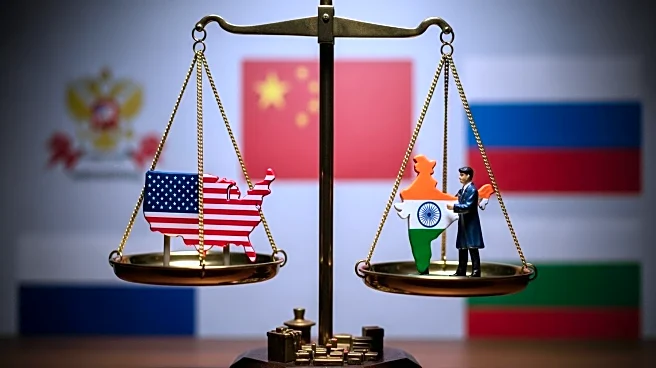What is the story about?
What's Happening?
Indian Prime Minister Narendra Modi is set to visit China for the first time in seven years, where he will meet with Chinese President Xi Jinping and Russian President Vladimir Putin. This visit comes in the wake of the United States doubling tariffs on Indian exports to 50%, a move attributed to India's continued purchase of Russian oil. The tariff increase has strained the previously strengthening ties between India and the US, prompting India to seek diversification in its trade relationships. Modi's visit to China coincides with the Shanghai Cooperation Organisation summit, where regional security and trade are expected to be key topics. The US tariffs have significantly impacted India's export market, particularly in labor-intensive sectors such as textiles and jewelry.
Why It's Important?
The US tariff hike on Indian exports represents a significant shift in international trade dynamics, affecting India's economic strategy and its geopolitical alliances. As the US is India's largest export market, the increased tariffs could lead to substantial economic repercussions for India, necessitating a reevaluation of its trade policies. This development may also influence global trade patterns, as India seeks to strengthen ties with China and Russia, potentially altering the balance of power in the region. The situation underscores the complexities of international relations, where economic decisions are closely tied to geopolitical strategies. For the US, the tariffs are a tool to pressure India regarding its stance on Russian oil purchases, but they risk alienating a key partner in the Indo-Pacific region.
What's Next?
India is expected to continue its efforts to diversify its trade partnerships, as evidenced by its recent export drive targeting 40 countries, including the UK and South Korea. Modi's meetings with Xi and Putin may lead to new agreements in trade and investment, further distancing India from US influence. Additionally, India is likely to deepen its ties with Japan, as indicated by recent discussions on defense, technology, and investment. These moves could help India mitigate the impact of US tariffs and strengthen its position in the global economy. The evolving relationships between these major powers will be closely watched by international stakeholders, as they could have far-reaching implications for global trade and security.
Beyond the Headlines
The tariff dispute highlights the broader geopolitical tensions between major world powers, with India caught between its traditional partnership with the US and its strategic interests with Russia and China. This situation raises questions about the future of international alliances and the role of economic policy in shaping diplomatic relations. The long-term implications could include shifts in global supply chains, changes in regional security dynamics, and the emergence of new economic blocs. As India navigates these challenges, its ability to balance competing interests will be crucial in maintaining its economic growth and geopolitical influence.















